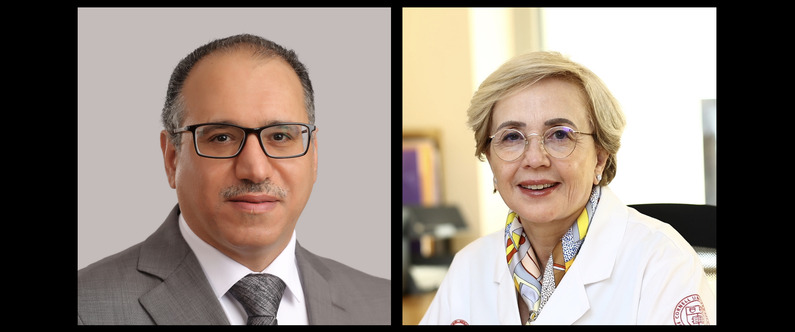Diabetes and medical education discussed at WCM-Q Grand Rounds
 Dr. Laith Abu-Raddad and Dr. Aicha Hind Rifai spoke at WCM-Q’s Grand Rounds.
Dr. Laith Abu-Raddad and Dr. Aicha Hind Rifai spoke at WCM-Q’s Grand Rounds.
The prevalence of diabetes among Qatari adults and strategies for enhancing medical education were explored in two Grand Rounds lectures presented by Weill Cornell Medicine-Qatar (WCM-Q).
Dr. Laith Abu-Raddad, professor of population health sciences at WCM-Q, gave a presentation in which he explained that the prevalence of diabetes among adult Qataris is predicted to rise from an estimated 17.8 percent today to 29.5 percent in 2050.
Dr. Abu-Raddad, who is also associate dean for extramural research funding and director of the biostatistics, epidemiology, and biomathematics research core of WCM-Q, said that diabetes incidence and prevalence is influenced by the long-term impact of lifestyle factors such as diet, exercise and smoking, and the fact that the Qatari population is aging. He also said that his research has projected that the proportion of type 2 diabetes incidence attributable to obesity will rise from an estimated 57.5 percent today to 65.7 percent in 2050. Diabetes prevalence is also growing in the non-Qatari resident population in Qatar, he said, though not quite as rapidly. Dr. Abu-Raddad said that mathematical modeling suggested that investment in individual-level and structural public health interventions have the greatest potential to prevent the onset of type 2 diabetes in individuals and slow the trend for rising prevalence of the disease at population level.
In a separate Grand Rounds lecture, Dr. Aicha Hind Rifai, assistant professor of clinical psychiatry at WCM-Q, discussed the need to reform the traditional model of medical education to better prepare trainee physicians for their future roles as healers and medical professionals.
Dr. Rifai gave a historical synopsis of the key concepts that have underpinned the practice of medicine in the modern era, which made the scientific method central, favored objectivity over subjectivity, and advanced a model of education developed in the US in the early 20th century that comprises pre-medical education in the basic sciences followed by clinical training. While the practice of medicine has changed a great deal in the past century, the model of medical education has remained remarkably similar, said Dr. Rifai. Furthermore, while scientific rigor and technological progress have brought about many advances in medicine and medical education, they have led to increased specialization of roles, larger care teams and fewer opportunities for physicians (and medical students) to develop working relationships with their patients.
To counter these trends and ultimately improve patient outcomes, dedicated physicianship curricula have been developed, explained Dr. Rifai. These models retain the commitment to scientific rigor but provide more opportunities for the development of a professional and moral identity because they are relationship-based and patient-centered. The physicianship curriculum provides enhanced continuity of learner experiences with patients and teachers, greater proximity to patients, and more supportive relationships that are built on trust between student, patient and teacher.
Dr. Rifai said: “At the heart of the physicianship curriculum is an understanding that clinical judgment depends not only on knowledge of causes, mechanisms, or names of diseases, but on knowledge of patients. Also that the background of clinical judgment is clinical experience - the things clinicians have learned at the bedside in the care of sick people.”
Both lectures were delivered as live webinars and were accredited locally by the Ministry of Public Health’s Department of Healthcare Professions Accreditation Section and internationally by the Accreditation Council for Continuing Medical Education (ACCME).